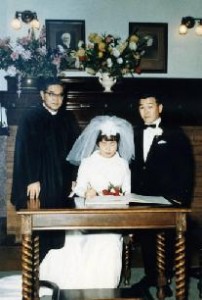Hiroshima Girls, Part 1: Life in Canada [5]
Jul. 3, 2010
War misfortunes beget bond with future husband
by Masami Nishimoto, Staff Writer
This feature series on the "Hiroshima Girls," also known as "Hiroshima Maidens," is a close look at a number of Japanese women who were impacted by the atomic bombing of Hiroshima. The series was originally published in 1996.
The Canadian policy of accepting skilled immigrants caught the eye of Misako Tachibana, 66, in the spring of 1966. She visited the Canadian Embassy in Tokyo, had an interview in English, and in less than three months secured permanent resident status as a beautician.
"I wanted to work in New York, but at the time it was difficult to obtain a U.S. work visa," Ms. Tachibana explained. "Canada is right next to America, so I didn't think there would be much difference." Her motivation for immigrating to Canada was not concrete.
Meanwhile, Japan was experiencing an economic boom. In her hometown of Hiroshima, where the preservation of the A-bomb Dome had been resolved, her father told her, "You don't have to live a difficult life in a foreign country." Still, he respected his youngest daughter's ambition.
The immigration bureau placed her in the city of Winnipeg in the province of Manitoba, central Canada. The name "Manitoba" is derived from the native Canadian term "Manito" or "Great Soul." Winnipeg was the capital of the prairie province, where fields of sugarcane and wheat spread as far as the eye could see. In Winnipeg, which had a population of 500,000 at that time, she obtained her third beautician's license.
Ms. Tachibana had confidence in her ability as a beautician, after the time she spent honing her skills in Tokyo and New York, but her early experiences in Canada turned out to be a great disappointment. She was quickly rebuffed at the first salon she applied to. After landing a job at another salon, she was forced to be on her feet all day, and yet the weekly wage was the equivalent of just two days' worth of tips in New York. Though this seemed to be the standard path for immigrants, to varying degrees, she could not bear it, and quit that salon after working there only two weeks.
"At that point, I wanted to go back to Japan, but a package of my things sent by ship had not yet arrived," she explained. Lacking some of these daily necessities, she found the Japanese United Church in the telephone book and visited it. A woman she met there referred her to a salon operated by a French-Canadian owner. "I worked so hard there that I started earning commissions in my first year," she said. Under the system of commissions, the monies were divided evenly between the owner and the beautician.
Two years later, she became acquainted with the man who became her husband. "It wasn't really a love story, but it was our fate," she said. "Yes, something like that," her husband Hiroshi, 60, agreed. He had been quiet until that point, then sank back into near silence from embarrassment.
"He also suffered needless pain due to the war," Ms. Tachibana said. When Hiroshi went outside to tend the garden, she intently continued his story. Born in Manchuria (northeastern China today), Hiroshi lost his mother as his family fled back to Japan and his father died soon after they reached his hometown in Kochi Prefecture. He came to Winnipeg in 1958, adopted by a distant uncle who lived there. When the couple met for the first time, Hiroshi was working for a mail-order company for farmers.
They felt a bond from the beginning. However, Hiroshi's closest friend and others around him wondered whether he was comfortable with the fact that Ms. Tachibana had been exposed to the atomic bombing. Hiroshi was back in the room at this point and nodded to confirm the events of the story.
"But that close friend," continued Ms. Tachibana, "eventually became Joe's best man at our wedding and still is his best friend." Joe is Hiroshi's English name. He has Canadian citizenship.
At the age of 38, Ms. Tachibana wore a wedding gown. Her father Goichi was overjoyed to hear news of the marriage and he fixed his gaze on the wedding photos when she paid a return to Hiroshima. Before Ms. Tachibana went back to Canada, she and her father enjoyed a tour of Tokyo aboard a sightseeing bus. "That was the first and the last trip my father and I took together," she said.
A Japanese doll presented by her father as a wedding gift now adorns the living room of her home in Canada.
(Originally published on June 21, 1996)








